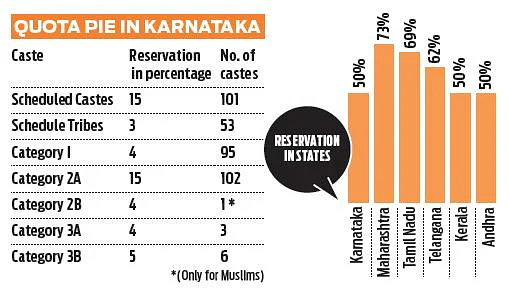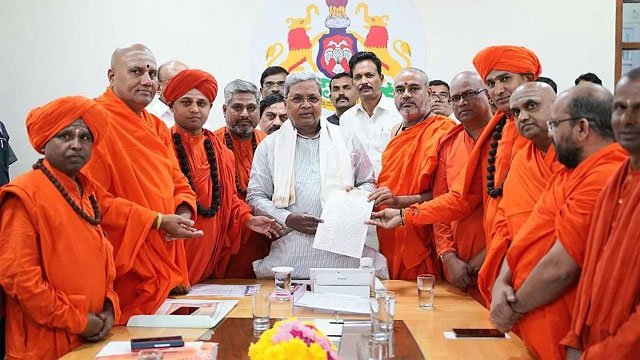Backward Community Seers in Karnataka have urged Karnataka Chief Minister Siddaramaiah to accept the caste census report after meeting him at his home office on Saturday, where they submitted their plea. The seers opined that the guarantees are more beneficial for the working class.
Responding to this, the Chief Minister said that the period to submit the caste census report has been extended for two more months. Former Member of the Karnataka Legislative Assembly Jayaprakash Hegde opined that it is not possible to submit Kantaraju’s report and hence the Chief Minister said that a decision will be taken after taking legal advice. H Kantharaju is the former chairman of the Karnataka State Commission for Backward Classes who headed the 2015 socio-economic survey.
The seers also spoke about the lands that are to be allocated to the Mutts. The Chief Minister said that he has instructed the tahsildar to submit the report in this regard and directed the Bangalore Rural Deputy Commissioners over the phone to give the report as soon as possible.
Siddarameshwar Swamiji of Bhovi Community Chitradurga, Valmiki Prasannanandpuri Swamiji, Jagadguru Niranjananandpuri Sri of Kanaka Gurpeeth of Kaginele Mahasansthan and seers of Backward Castes Mutt, Backward Classes Welfare Department Commissioner K.A. Dayananda were present at the meeting.
While there is demand from OBC communities to accept the report of the survey conducted back in 2015, dominant communities of Vokkaligas and Veerashaiva-Lingayat communities have argued that the survey is “unscientific” and should not be accepted. They have demanded a fresh survey.
Why did the backward community seers demand a fresh survey?
Days after Vokkaliga seers rejected the 2015 Karnataka caste survey report, Lingayats, the other dominant community in the state, on Thursday expressed disapproval of the report calling it unscientific and demanded a fresh survey.
The Kantharaj committee’s report, often referred to as the “caste census”, has been a topic of dispute since its commissioning during the first term of chief minister Siddaramaiah. Despite its completion, no government has officially accepted the report to date.
Veerashaiva Mahasabha president and senior Congress MLA Shamanur Shivashankarappa labelled the report as ‘flawed.’ The former minister targeted his own party and claimed that the report was written in a home.
Veerashaiva Mahasabha, the apex body of the Lingayat community, held a meeting in Bengaluru where they demanded a thorough review of the report, citing flaws in the data collection process. According to Shivashankarappa, the survey was inadequately conducted and the report was crafted in a manner that underrepresented their community.

“There are many flaws in the data collected by the committee. The survey was not done at houses belonging to our community. The survey was not done satisfactorily. A fresh survey must be done scientifically with advanced technology. The report was written by sitting in a home. In the report, the population of Veerashaiva Mahasabha was shown less, it will have a severe impact on our community,” the Davanagere South MLA said.
Shivashnakarappa clarified that there were no immediate plans to lead a delegation to meet with the chief minister concerning this matter. The opposition to the Karnataka government’s decision to accept the 2015 caste census report has grown with the prominent seers of the Vokkaliga community expressing their displeasure.
Nirmalanandanatha Swami, a prominent Vokkaliga spiritual leader who led the meeting of the community leaders last week, had called the report “deeply flawed and unscientific”.
The seer said, “The current report is incomplete and could lead to injustices within various communities.” He urged the government to reconsider its decision and suggested that a comprehensive recovery of the population census is necessary to rectify the report’s deficiencies.
Meanwhile, federations representing Dalits, tribals, and other backward classes (OBC) have demanded that the findings of the caste census be made public. They allege that certain leaders from dominant communities within the government are blocking the report’s release. They argue that sharing the report’s findings would provide clarity on caste-wise population distribution, and educational, social, and economic status, potentially ending disputes over these issues.

“We’re not insisting on implementing the report. But the government must first receive it and lay it in the assembly for a discussion,” Yennegere Venkaramaiah, convener of the Backward Castes Federation, told media.
KM Ramachandrappa, a representative of the marginalised communities’ federation, has said leaders from dominant communities from within the government are obstructing the report’s release by. He added that support from marginalized communities played a pivotal role in bringing the Congress government to power.
“The control of power and wealth is currently concentrated within the hands of two dominant communities. This is a significant factor behind their opposition to the report. Once the report is made accessible to the public, it will offer a comprehensive overview of the state’s caste-wise population distribution,” he said.
The groundwork for the caste census was laid during Siddaramaiah’s initial term as chief minister when the state undertook an extensive 2015 survey costing ₹162 crore. The data was collected from 10.6 million households in Karnataka, involving a workforce of 160,000 personnel who visited homes across the state. Despite Siddaramaiah’s announcement to accept the report in June 2023, its contents and the released date have remained undisclosed.
The original backward community seers report went missing
The Karnataka State Commission for Backward Classes under its current Chairman K Jayaprakash Hegde, which has the caste census findings, has been given time till 31 January 2024 to submit the report to the government.
With pressure mounting on his government, from a certain section, to make public the state’s survey, after the Bihar government released findings of its caste survey recently, Chief Minister Siddaramaiah has said that a decision will be taken once he receives the report.

However, the survey is mired in controversies even before the report is submitted to the government, amid deep divisions within the ruling Congress, stiff opposition by the two dominant communities against its acceptance, and the survey’s original “worksheet” copy missing.
With strong disapproval from the two politically influential communities, the survey report may turn out to be a political hot potato for the government, as it may set the stage for a confrontation, with Dalits and OBCs among others demanding it be made public.












